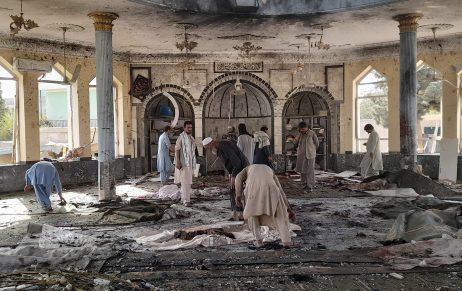
Is the Islamic State in Afghanistan targeting China?
On October 8, a suicide bomber struck a Shiite mosque in Afghanistan’s Kunduz province. The bombing killed more than 70 people and injured over 140 worshippers belonging to the Hazara minority community. Soon after, the Islamic State terror group’s local affiliate in Afghanistan, known Islamic State Khorasan (ISK), claimed responsibility for the heinous attack via an online propaganda statement.
ISK identified the bomber as “Muhammad al-Uyghuri,” saying the assault targeted both “rafidites” (a derogatory term used by jihadists to refer to Shiites) and the Taliban government for its purported willingness to deport Uyghurs from Afghanistan in response to requests from China.
ISK’s aggression toward religious and ethnic minority civilian populations is not uncommon. As the Taliban are working to transform themselves from a radical insurgent movement to a legitimate state structure, attacks on such minority communities are meant to foment sectarian strife while casting doubt on the unrecognized new rulers’ ability to deliver appropriate security to the country’s people.
However, the group’s apparent attempt to justify the targeting of the Hazara minority community in Afghanistan through rhetoric about China and Uyghurs is both unusual and perplexing.
An analysis of the attack indicates that ISK is potentially considering pivoting its China strategy away from what it was previously assessed to be, moving from a relatively non-provocative posture toward a more hands-on stance.
Furthermore, ISK is apparently viewing the Taliban’s stated incentives to deport Uyghur militants as an opportunity to position itself as a new protector of the Uyghurs, with the aim of welcoming disgruntled Uyghur militants into its ranks.
ISK emerged in 2015, when the Islamic State in Iraq and Syria announced its expansion to the historic “Khorasan” region, which encompassed parts of modern-day Afghanistan, Pakistan, Iran, and Central Asia. Initial members of the group predominantly included former hardline members of the Afghan and Pakistani Taliban, al-Qaida, and other militant groups.
Since its inception, ISK has seen the Taliban as its strategic rival and ideological opponent. It has targeted Taliban positions and attempted to encourage defections from the movement. From 2015 to 2020, amid sustained military pressure by the U.S., Afghan government forces and the Taliban contained the ISK threat.
Since 2020, under a new leader, Shahab al-Muhajir, ISK has ramped up local violence as part of its resurgence campaign against the Afghan government and the Taliban. According to U.N. reporting, ISK had an estimated 500 to 1,500 fighters under its control before the fall of the Afghan government in mid-August, and it was responsible for 77 attacks across Afghanistan in the first quarter of 2021 alone.
Since the Taliban takeover, the group has intensified attacks on civilian spaces, including religious institutions. Some of these and earlier attacks saw the involvement of the group’s Afghan, Indian, Tajik, and Pakistani members, among others.
The Kunduz attack is the first time that ISK has publicly confirmed the mobilization of an ethnic Uyghur – while not providing any detail about his country of origin – to carry out an attack in Afghanistan on its behalf. Previously, Uyghur militants had been invisible in both the online propaganda and battlefield activities of the group.
The Uyghurs are a Turkic-speaking, mostly Sunni Muslim ethnic community native to the Xinjiang Uyghur Autonomous Region (XUAR) of China. Although the bomber’s nom de guerre (“al-Uyghuri”) implies he was an ethnic Uyghur, it does not necessarily mean that he was from Xinjiang. Uyghur fighters who claim to come from China usually adopt the nom de guerre of “al-Turkistani” to emphasize their separatist cause: the establishment of an independent Islamic state in Xinjiang, which they often refer to as “East Turkistan.” Many foreign countries, including Turkey and Afghanistan, host varying numbers of Uyghur communities, any of which the attacker may have come from.
Regardless of the attacker’s national origin, by highlighting the Uyghur involvement in the attack, ISK is sending important messages to its intended audiences: China, the Taliban, and the former’s Uyghur affiliates.
Source: The Diplomat





